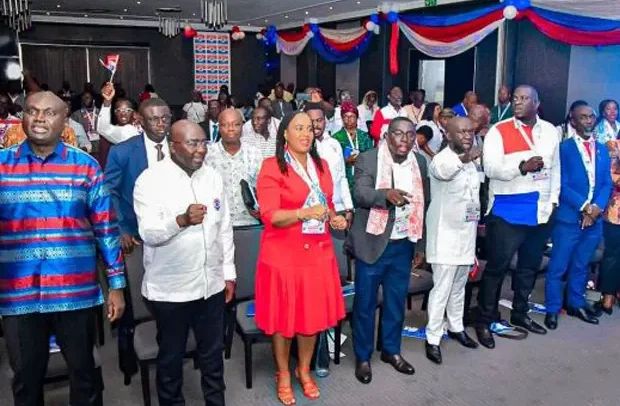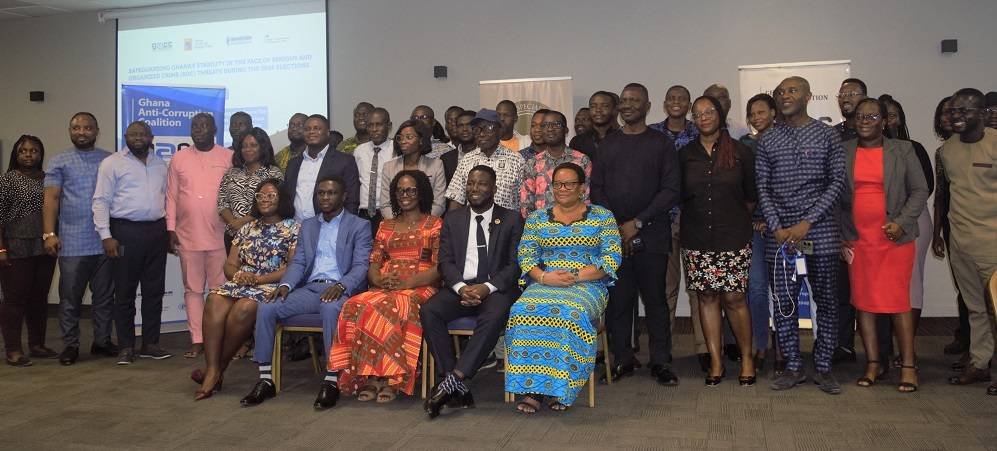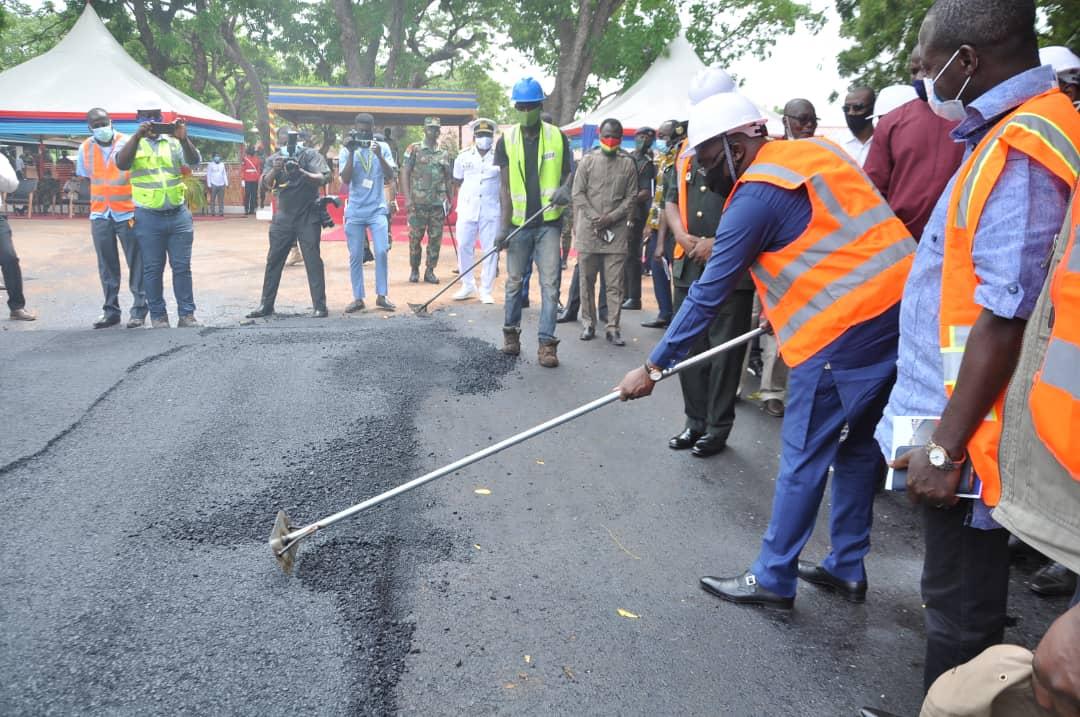
By Richard AGBANYO & Timothy Azaa AYAMGA
‘Advancing Democratic Integrity in Ghana: The Crucial Role of Transparent Political Financing’ emphasises the significance of transparency in political financing as a cornerstone for strengthening Ghana’s democracy. The narrative underscores the integrity of Ghana’s democratic institutions and the collective commitment of its citizens to uphold principles of transparency, accountability and justice are pivotal to the nation’s democratic health.
While this feature does not provide specific dates in the article, the context suggests an ongoing and evolving effort toward enhancing transparency in political financing in Ghana. The discourse likely gained momentum following revelations and concerns about the potential for illegal activities to fund political campaigns, highlighted in speeches by prominent figures like former President John Mahama.
The article calls for a multi-faceted approach to reform political financing, including establishing clear regulatory frameworks that mandate full disclosure of campaign finances, exploring public funding for political parties to reduce dependence on private donations, and leveraging technology to modernise and democratise political contributions.
The goal is to foster a political environment where financing is transparent, ensuring that electoral processes are fair and not unduly influenced by wealth or illicit funds. The collective effort from policy-makers, civil society, political entities and citizens is crucial to achieving this goal, aiming to fortify Ghana’s democratic structures and ensure they reflect the democratic ideals cherished by its people.
In essence, the article advocates for a continuous and concerted effort to enhance political financing transparency, recognising it as a vital step toward sustaining and advancing Ghana’s democratic integrity.
Ghana’s democratic journey is at a pivotal point where the transparency of political financing is not just a regulatory requirement, but a fundamental pillar upholding the integrity of our governance. This article delves into why fostering transparency in political financing is indispensable for enhancing Ghana’s democratic fabric and how it aligns with the collective aspirations of its people.
Ghana’s democracy transitions
The foundation of democracy in Ghana is a testament to the country’s resilience and commitment to upholding democratic values, reflecting a broader historical trajectory that values the voice of the people, the rule of law, and the principles of transparent and accountable governance.
In Ghana, a nation celebrated for its democratic values, the integrity of political financing has emerged as a cornerstone for ensuring the health and sustainability of its democratic processes. The feature article ‘Advancing Democratic Integrity in Ghana: The Crucial Role of Transparent Political Financing’ delves into the critical importance of transparency in the flow of political funds. It underscores the concept that the essence of Ghana’s democracy is deeply rooted in the integrity of its institutions and the collective commitment of its people to uphold the principles of transparency, accountability, and justice. Through a concerted effort and unwavering commitment to reform, the article advocates for a political financing system that genuinely reflects the democratic ideals Ghana aspires to embody, outlining the path ahead, albeit challenging, toward nurturing a more accountable and transparent political landscape.
The strength of Ghana’s democracy is inherently tied to the robustness of its institutions and the commitment of its citizens to uphold core values: transparency, accountability and justice. These principles are the bedrock upon which trust between the government and the governed is built, ensuring that the democratic process is not only observed but also respected and cherished.
The foundation of democracy, a concept that has evolved over millennia, underpins the governance systems of democratic nations worldwide, including Ghana. Democracy’s roots can be traced back to ancient civilizations, most notably ancient Greece around 507 B.C. under the leadership of Cleisthenes in Athens, which is often hailed as the birthplace of democracy. This system was based on the principle of rule by the people, either directly or through elected representatives.
Over centuries, the concept of democracy has evolved and been influenced by various philosophical, political and social developments. The Magna Carta of 1215 in England laid early groundwork for legal constraints on the king’s power, a key democratic principle. The Enlightenment era, particularly in the 17th and 18th centuries, further propelled democratic ideas, emphasising individual liberty, equality and the concept of a social contract.
In the context of Ghana, democracy took a significant turn post-independence in 1957. After several coups, Ghana firmly transitioned to a stable democratic system in 1992 with the adoption of a new constitution, marking the beginning of the Fourth Republic. This constitution established a multi-party system, regular elections, separation of powers and respect for human rights, laying a solid foundation for the democracy we see in Ghana today.
The foundation of democracy in any nation, including Ghana, is built on key principles such as transparency, accountability and the rule of law. These principles ensure that citizens have the power to elect their leaders in free and fair elections, have rights protected by an independent judiciary, and have access to information about the actions of their government.
Over the years, Ghana has demonstrated a commitment to these democratic principles, holding regular elections, maintaining a vibrant civil society, and upholding a relatively free press. However, challenges remain, especially in the realm of political financing, where transparency and accountability are crucial to prevent corruption and undue influence, ensuring that the democratic process is not compromised.
Challenges in political financing
The challenges in political financing in Ghana, set against the backdrop of the global economic landscape, reflect a complex interplay of domestic issues and broader international trends. While specific dates for each development are not always clear-cut, a general timeline of key events provides insight into the evolution of these challenges.
Pre-1992: Before the establishment of the Fourth Republic, Ghana’s political landscape was marked by instability and military rule, with limited transparency in political processes, including financing.
1992 onward: The adoption of the 1992 Constitution marked the beginning of a new democratic era in Ghana. However, the nascent democratic institutions faced challenges, including establishing transparent political financing mechanisms.
Early 2000s: As Ghana’s democracy matured, concerns about the sources and uses of political funds grew. The global economy’s expansion, marked by increased international trade and investment, provided both opportunities and new challenges for political financing, including the risk of foreign interference and illicit financial flows.
2010s: The global financial crisis of 2007-2008 and subsequent economic fluctuations had ripple-effects on Ghana’s economy, influencing political financing. Economic hardships could exacerbate the reliance on opaque and potentially corrupt funding sources.
In the context of increasing global digitalisation, Ghana, like many countries, has seen the rise of new financing methods, including online crowdfunding. While this presents opportunities for broader political participation, it also raises new challenges in monitoring and regulating political funds.
The call for transparency
Global financial crisis (2007-2008): This period underscored the interconnectedness of the global economy, highlighting how economic downturns can impact political stability and financing as governments and political entities grapple with reduced resources.
Rise of digital economy: The global shift toward a digital economy has transformed political financing, with digital platforms enabling broader participation but also creating new avenues for opaque funding.
COVID-19 pandemic: The economic disruptions caused by the pandemic have had significant implications for political financing worldwide, including in Ghana, affecting government revenues, campaign financing and the overall economic context in which political activities occur.
In Ghana, the challenges in political financing are multi-faceted, involving issues of transparency, accountability and the influence of money on political processes. These challenges are intertwined with global economic trends, demonstrating how domestic political financing issues can be influenced by broader international economic dynamics.
There is no gain in saying that political financing in Ghana, like in many democracies, faces challenges that can undermine the very essence of fair and free elections. The infusion of undisclosed, and sometimes illicit, funds into political campaigns erodes public trust and skews the democratic process. Stakeholders across the board – from political entities to the electorate – must recognise and confront these challenges head-on.
Transparency in political financing is not merely about adherence to regulations; it is about fostering a culture of openness that permeates all levels of political engagement. This entails a clear disclosure of sources of campaign funding and expenditure, and the adherence to established legal frameworks designed to prevent the undue influence of wealth in politics.
The call for transparency in political financing in Ghana has gained momentum over recent years, driven by a recognition of the importance of accountability and fairness in democratic processes. The feature provides a general timeline that illustrates the key moments in this ongoing discourse:
Pre-2000s: Before the 2000s, Ghana, like many other democracies, grappled with issues of opaque political financing, with limited regulatory frameworks in place to ensure transparency and accountability.
Early 2000s: The early 2000s witnessed a growing recognition of the need to address challenges in political financing. Efforts were made to introduce reforms aimed at enhancing transparency, although implementation remained a challenge.
2012: The issue of political financing gained prominence during the 2012 General Elections in Ghana. Concerns were raised about the sources of campaign funding and the potential influence of money on electoral outcomes.
2016: The 2016 elections further highlighted the importance of transparency in political financing. Calls for reform intensified amid allegations of irregularities and the perceived influence of money in politics.
2018: In 2018, former President John Mahama delivered a speech at the University of Professional Studies, Accra, where he underscored the imperative of transparent and regulated political party financing. This speech catalysed renewed discussions on the topic.
2019: The issue of political financing remained on the agenda in 2019, with civil society organisations, political actors and the public advocating for reforms to enhance transparency and accountability in the electoral process.
2020: The 2020 General Elections provided another opportunity to address concerns about political financing. Despite progress in some areas, challenges persisted, underscoring the need for sustained efforts to promote transparency and integrity in Ghana’s political landscape.
The call for transparency in political financing in Ghana is ongoing, reflecting a growing awareness of the importance of accountable governance and fair electoral practices. While progress has been made in recent years, continued efforts are needed to strengthen regulatory frameworks, enhance oversight mechanisms and promote a culture of transparency and integrity in political financing.
Making things happen
The journey toward a transparent political financing system is challenging, necessitating a collective will and concerted effort from all sectors of society. Policy-makers, civil society organisations, political entities and the citizens themselves must collaborate to push for reforms that enhance transparency and accountability. It is this collective endeavour that will cement Ghana’s democratic credentials and ensure that the political system reflects the people’s will and upholds democratic ideals.
The concept of collective will and action is integral to addressing challenges in political financing and fostering transparency and accountability in Ghana’s democratic processes. This summary encapsulates the importance of collaboration and concerted efforts across various sectors of society:
Collective will and action entail a collaborative approach involving policy-makers, civil society organisations, political parties, the private sector and citizens. By working together, these stakeholders can leverage their respective strengths and resources to drive meaningful change in political financing practices.
Policy-makers play a crucial role in enacting legislation and regulatory frameworks that promote transparency and accountability in political financing. By championing reforms such as mandatory disclosure of campaign finances, limits on campaign spending, and oversight mechanisms, policy-makers can create an environment conducive to fair and free elections.
Civil society organisations serve as watchdogs, advocating for transparency and accountability in political processes. Through research, advocacy and public awareness campaigns, civil society can mobilise citizens and hold political actors accountable for their actions, thereby exerting pressure for reform.
Political parties have a responsibility to adhere to ethical standards and uphold democratic principles in their financing activities. By voluntarily disclosing their sources of funding, adopting internal regulations on campaign spending and embracing transparency measures, parties can demonstrate their commitment to fair and transparent electoral practices.
The private sector, including businesses and wealthy individuals, also has a role to play in promoting transparent political financing. By refraining from engaging in illicit funding practices and supporting initiatives aimed at enhancing transparency, the private sector can contribute to a level playing field in electoral contests.
At the heart of collective will and action is citizen engagement. Citizens have the power to demand accountability from their elected representatives and hold them to high ethical standards. By participating in electoral processes, exercising their right to vote and advocating for reforms, citizens can drive positive change and ensure that political financing practices reflect the values of transparency, integrity and fairness.
It must be emphasised that collective will and action are essential ingredients for advancing transparency and accountability in political financing in Ghana. By fostering collaboration among stakeholders, advocating for policy reform and actively engaging in democratic processes, Ghana can strengthen its democratic institutions and uphold the principles of good governance.
The path to reforming political financing in Ghana is fraught with complexities, but is essential for the sustenance of its democracy. By committing to transparency, Ghana can ensure that its political system is resilient, fair and reflective of the democratic ideals it aspires to uphold. This commitment must translate into actionable strategies that involve the review of existing laws, the introduction of innovative practices, and the empowerment of oversight bodies to enforce compliance and promote best practices.
Conclusion
In navigating the complexities of political financing in Ghana, it becomes evident that transparency and integrity are indispensable pillars of a healthy democracy. The evolution of Ghana’s democratic landscape, from the tumultuous years of military rule to the establishment of the Fourth Republic, underscores the nation’s commitment to upholding democratic values.
Challenges in political financing, both domestic and influenced by global economic trends, have necessitated a concerted effort to promote transparency and accountability. The call for reform, echoed by stakeholders across various sectors of society, emphasises the collective will and action needed to address these challenges effectively.
From policy-makers championing legislative reforms to civil society organisations mobilising citizen engagement, and from political parties committing to ethical standards to the private sector supporting transparency initiatives, the journey toward transparent political financing requires a multi-faceted approach.
As Ghana navigates this path, it is crucial to recognise the interconnectedness of these efforts and the shared responsibility of all stakeholders in upholding democratic integrity. The collective will and action of Ghanaian society, fuelled by a commitment to transparency, accountability and justice, will be the driving force behind meaningful reform in political financing.
Transparency in political financing is not just a regulatory requirement but a fundamental aspect of democratic governance, ensuring accountability and fairness in electoral processes.
Addressing challenges in political financing requires a collaborative approach involving policy-makers, civil society, political parties, the private sector and citizens.
The call for reform must be met with concrete actions, including legislative changes, oversight mechanisms and voluntary commitments from political actors to promote transparency and integrity.
Upholding democratic values of transparency, accountability and justice is paramount in fostering trust in political institutions and ensuring the legitimacy of democratic processes.
While the road ahead may be challenging, it is through collective will and action that Ghana can realise its aspirations for a political financing system that reflects the democratic ideals it upholds.
Advancing democratic integrity through transparent political financing is a shared responsibility that transcends political affiliations. It is a commitment to the future of Ghana, ensuring that it remains a beacon of democracy where the integrity of institutions and the will of the people prevail. As Ghana continues this path, the collective effort and unwavering commitment to reform will undoubtedly fortify its democratic structure, making it more inclusive, accountable and reflective of the true spirit of its people.
In closing, the journey toward advancing democratic integrity in Ghana through transparent political financing requires perseverance, commitment and a shared vision of a fair and inclusive democracy. By embracing this collective ethos, Ghana can strengthen its democratic institutions and build a future where the principles of transparency, accountability and justice are upheld for the benefit of all its citizens.
Richard Agbanyo is a Lecturer, Economics and Actuarial Science, University of Professional Studies; and Timothy Azaa Ayamga is also a Lecturer, Department of Accounting, University of Professional Studies.
The post Advancing democratic integrity: …the crucial role of transparent political financing appeared first on The Business & Financial Times.
Read Full Story




















Facebook
Twitter
Pinterest
Instagram
Google+
YouTube
LinkedIn
RSS